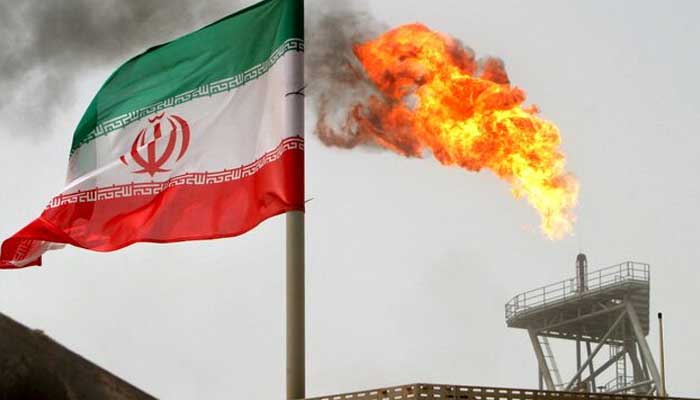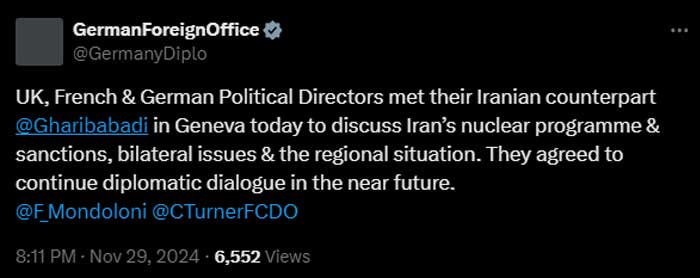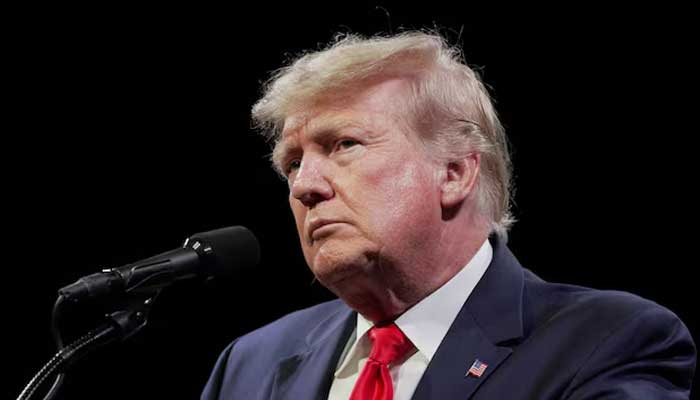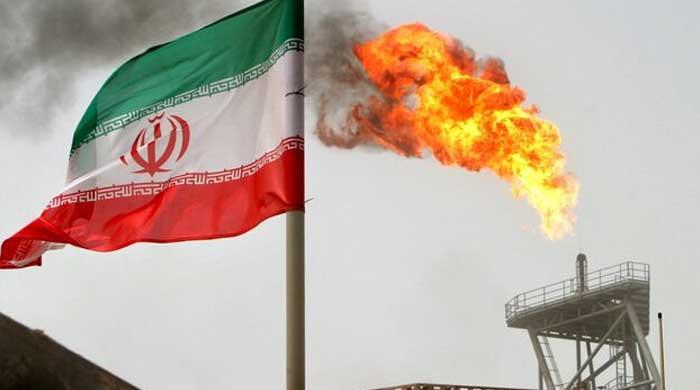
- German Foreign Minister: The two sides agreed to continue diplomatic dialogue in the future
- Iran’s Deputy Foreign Minister describes Friday’s discussions as “frank.”
- Tehran hopes to mend relations with Europe amid the nuclear talks.
Geneva: Iran, Britain, France and Germany agreed to continue diplomatic talks after a secret meeting on Friday that addressed Tehran’s nuclear programme, amid rising tensions even before Donald Trump returns to the White House.
Following the talks in Geneva, which were shrouded in an unusual level of secrecy, each side took to social media to say that the discussions focused on the Iranian nuclear program, sanctions imposed on Iran, and other regional issues.
The German Foreign Ministry and high-level diplomats representing France, Britain and Iran said separately on the 10th of this month that the two sides “agreed to continue diplomatic dialogue in the near future.”

Providing further details, Kazem Gharibabadi, Iran’s deputy foreign minister for legal and international affairs, described Friday’s discussions as “frank.”
“We prefer the path of dialogue and participation,” he wrote.
The risks were evident in a warning from the head of British Foreign Intelligence that Iran’s nuclear ambitions constitute a major global security threat, despite its weak position after the setbacks suffered by its Islamist allies Hamas and Hezbollah in the Gaza Strip and Lebanon.
The head of the Secret Intelligence Service, Richard Moore, said in a speech in Paris: “The militias allied with Iran throughout the Middle East have suffered serious blows.” “But the regime’s nuclear ambitions still threaten us all.”
Trump’s shadow
Friday’s meeting was held in the context of severe tension in the Middle East between Israel, Iran and its allies.
Israeli Prime Minister Benjamin Netanyahu said on Thursday that Israel will do “everything” to prevent Tehran from obtaining a nuclear weapon.
The West’s accusation that Iran is supplying Russia with explosive drones for its war in Ukraine also darkened the background to Friday’s talks.
On January 20, Trump, who pursued a “maximum pressure” policy against Iran during his first term as President of the United States, returns to the White House.

Iran hopes to repair relations with Europe, while at the same time maintaining a firm stance.
In an interview with The Guardian Iranian Foreign Minister Abbas Araqchi warned in the New York Times on Thursday that frustration in Tehran over unfulfilled commitments, such as lifting sanctions, is fueling debate over whether the country should change its nuclear policy.
Friday’s talks had predicted European countries’ cooperation with the United States in order for Iran to be censured by the United Nations’ International Atomic Energy Agency for its lack of cooperation on nuclear issues.
The IAEA’s rebuke sparked a defiant response from Iran, which criticized the move as “politically motivated” and responded by announcing the launch of “new advanced centrifuges” designed to increase its stockpile of enriched uranium.
A German Foreign Ministry spokesman told reporters on Friday that this was “clearly going in the wrong direction.”
“The imperative for Iran right now must be to de-escalate.”
“Double disaster”
Iran insists on its right to obtain nuclear energy for peaceful purposes, and constantly denies any ambition to develop the ability to make weapons.
Supreme Leader Ayatollah Ali Khamenei, who has ultimate authority in Iran’s decision-making process, issued a religious fatwa prohibiting atomic weapons.
But according to the International Atomic Energy Agency, it is the only non-nuclear-weapon state that enriches uranium to 60 percent purity.
The International Atomic Energy Agency said in a report that Iran intends to install six thousand new centrifuges at its sites in Fordow and Natanz, with the aim of enriching up to five percent.
Although it is well below the current levels at which it is enriching, it is higher than the 3.67 percent limit that Tehran agreed to in the landmark 2015 nuclear agreement.
This agreement between Tehran and the major powers aims to ease the stifling Western sanctions on Iran in exchange for limiting its nuclear program to prevent it from developing weapons capabilities.
Tehran adhered to the agreement, but in 2018, during Trump’s first presidency, Washington unilaterally withdrew from the agreement and imposed severe sanctions on Iran.
For Tehran, the goal of Friday’s talks was to avoid a “double disaster” scenario of renewed pressure from both Trump and European governments, according to political analyst Mostafa Shirmohammadi.
